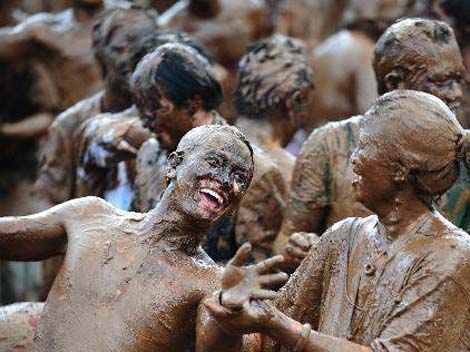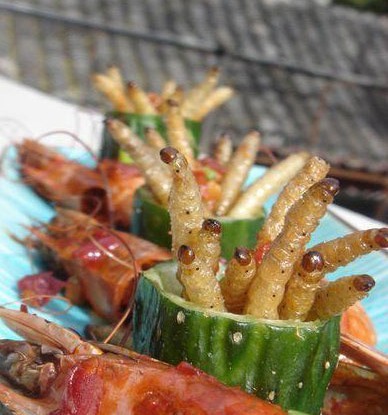Mud Carnival

Tourists and local Va ethnic people are seen covering with mud during the "Monihei" carnival held in the Va Ethnic Autonomous Prefecture of Cangyuan, southwest China's Yunnan Province, May 2, 2011. During the four-day carnival, people mud each other with clay-like material to express their wishes for health and happiness. (Xinhua/Qin Qing)
A carnival called "Monihei" is held in the Va Ethnic Autonomous Prefecture of Cangyuan, southwest China's Yunnan province, annually in early May. During the gala, local people spread mud on each other with clay-like material to express their wishes for health and happiness.
Va people believe the black color is the symbol of diligence and good health. Most of their clothes are black-based, for example. The legend says in order to pursue immortality, Va people found the miracle herbal medicine after unremitting endeavors. They made it into herbal powders, stirred them with water into a paste, and smeared it on peoples’ bodies during the carnival. It is said the darker one’s body is smeared, the more blessings one will obtain. If it is smeared on a child’s face, he or she will receive the blessing of peace; if it’s on a girl’s face, she will become more beautiful; if it’s on an elder’s face, he or she will receive the blessing of longevity.
Bathing Gala
A popular festival annually held at Liu Ku, capital of the Lisu ethnic group autonomous prefecture in China’s southwest Yunnan province, is called the Bathing Gala. During the celebration, Lisu people of all ages and genders gather to take a bath simultaneously in the hot spring to wash the dirt off and welcome the coming of spring.
It is usually held from December 5 to January 10 of the next year on the Chinese lunar calendar. From January 2 to 7, Lisu people gather at the hot spring, where they live temporarily for six days. They bring quilts and blankets, meat, seasoning and cooking utensils along with them for celebration.
Scare Ghosts Away via Caressing Breasts
It is customary for the locals to hold events to “scare the ghosts away” during the Chinese Ghost Festival, which falls on July 14 and 15 on China’s lunar month annually.
In Chuxiong Yi ethnic group autonomous prefecture of China’s Southwest Yunnan province, their tradition during a festival carnival allows the male youths to caress their female counterpart’s breasts in public at their disposal, even if they don’t know each other. It is believed caressing breasts can bring good luck to the male and the female. The ghosts are scared away by the sound of the carnival enjoyment as a result.
Ethnic Chinese Valentine’s Day
People from the western culture must know Valentine’s Day well, but they might know about the ethnic Chinese Valentine’s Day which falls on China’s lunar March 3.
The time-honored festival popular with South China’s Hainan Li ethnic group originates from an age-old legend about love. It is believed a long time ago, a massive flood devastated almost everything. A brother and a sister who survived decided to build respective families to revive their ethnic group, but tried in vain because few people lived. Having no other choices, the sister got her face tattooed to disguise herself as a stranger to her brother. Ultimately, they got married and had children, helping their group out of the disaster.
On every lunar March 3, Li people in gala dress memorialize the couple using ethnic music singing, dancing and other celebrations. The most typical way of showing love between the male and the female on that day is to sing a mountain song interactively -- a type of song popular in China’s ethnic group-inhabited areas. If one party finds the right person during the singing carnival, he or she gives a love-token to their counterpart. Then they leave to go on dating.
Chewing Worms Celebration

Cooked worms and insects captured alive on every Chinese lunar June 2, an worm-eating festival for China's ethnic Ge Lao people living in Sichuan and Yunnan provinces.
Have you ever heard of people eating grasshoppers, chrysalises, and worms? In southwest China’s Guizhou, Sichuan and Yunnan provinces, one ethnic group named Ge Lao typically eats those foods.
On every Chinese lunar June 2, Ge Lao people celebrate the festival by eating cooked worms and insects captured alive on the particular day, wishing a good harvest and no plague of insects that year. It is customary for all the married Ge Lao women to return to their parents’ home and catch worms on the way back. While the family gathers at the dinner table, the senior member usually says, ”Let’s get started! Chew them up!“ After that, people start to enjoy the delicacies.
Compete to Win “Love Food”
On every lunar March 15 to 17, an age-old festival about love and dating always peaks the interest of the ethnic Yi people living in China’s southwest Guizhou province. Among series celebrations held those days, there are contests to win women-cooked delicacies for loved ones.
Starting early in the morning during those days, young Yi women start to prepare meals for their potential boyfriends. The meals are characterized by shrimps captured alive by women that day. Later on, the female youths carry their meals to meet their counterparts on the public square. By using singing and dancing competitions, they find their loved ones. During the contest, the male party has to win the female if he would like to have a taste of the delicious food.
For the married women, they have to return to their parents' home and sing a special love song during the period.





